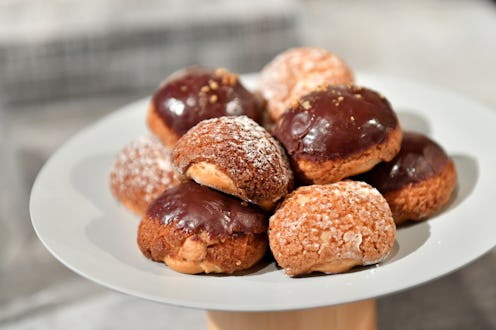Life
So Apparently Everything We Thought We Knew About Getting A Sugar Rush Is A Lie

How many of us reach for a pick-me-up to make it through that mid-afternoon slump? For some people, that might entail walking to grab an iced latte, or eating a granola bar as a pre-dinner snack. If you’re like me, it’s the afternoon sweet that I will inevitably crave at exactly 2 p.m. on most days. Whether it’s a cookie, a chocolate-covered almond, or a date, these snacks spark joy for me in an otherwise extremely regular day, and it’s a routine I look forward to. But it turns out that science doesn’t, in fact, support this agenda. According to new research, that "sugar rush" isn't a real thing. It turns out that sugar doesn’t actually improve any aspect of your mood, and may actually make it worse.
The study, published in Neuroscience & Biobehavioral Reviews, was an overview focused on the relationship between the immediate consumption of carbohydrates and mood. (Carbohydrates are the larger category of nutrients that provide energy, along with protein and fat; sugar is what's known as a "simple" carbohydrate, according to Livestrong, meaning that it breaks down more quickly.) Based on data from 31 previously published studies that included 1,259 total participants, the results of this study suggested that so-called “sugar high” is a scam and sugar consumption didn’t present any beneficial effects on mood, even when variables like the quantity of sugar consumed and the type of sugar were also taken into consideration. In fact, carbohydrate consumption was associated with decreases in alertness within an hour post-ingestion, along with an increase in fatigue 30 minutes after consumption.
“The idea that sugar can improve mood has been widely influential in popular culture, so much so that people all over the world consume sugary drinks to become more alert or combat fatigue,” lead study author Dr. Konstantinos Mantantzis said in a statement. “Our findings very clearly indicate that such claims are not substantiated — if anything, sugar will probably make you feel worse.”
“We hope that our findings will go a long way to dispel the myth of the ‘sugar rush’ and inform public health policies to decrease sugar consumption,” said study co-author Professor Elizabeth Maylor in the statement.
It’s important to note that the study does have some limitations that the researchers outline. Though the data demonstrates the immediate effect of sugar consumption in healthy adults, it doesn’t account for the how the response might be different in other populations like children and people with varying health conditions. People with mood disorders, for example, may exhibit differing sensitivities that need to be researcher further. And while the idea of a "sugar rush" may not be a thing, more studies are necessary to better comprehend how sugar may interact with other nutrients to induce different effects in people. It also should be noted that carbohydrates and sugar can come from all kinds of diverse sources, with their own nutritional merits (like fruit or starchy vegetables, which have been linked to higher energy levels over time).
All this being said, if you think your brownie sparks joy, eat the brownie. Regardless of what science says, I will continue looking forward to my 2 p.m. snack.